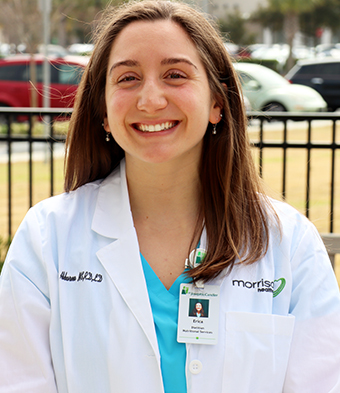Ten tips for eating through cancer treatment
Cancer
LCRP dietitian explains why it’s important to maintain weight, muscle mass during your cancer diagnosis
Not wanting to eat during cancer treatment? Are nausea or difficulty swallowing forcing you to skip meals? You are not alone. Changes to appetite are a common result of a cancer diagnosis, treatment to follow and even during remission.
Cancer and its treatment can affect your appetite in a variety of ways.
Tumors can directly affect your appetite because of hormones released that distort your body’s perception of hunger cues, says Erica Abbarno, outpatient oncology dietitian at the Nancy N. and J.C. Lewis Cancer & Research Pavilion in Bluffton and Hilton Head.

The location of the tumor, especially if it’s around the GI tract, also can interfere with the intake of food, trouble swallowing or make a person feel full without eating. Also, the stress, anxiety and even sometimes depression that come with a cancer diagnosis can impact your appetite, Abbarno adds.
And then there are the side effects of cancer treatment. Whether it’s chemotherapy or radiation therapy, a large majority of cancer patients will experience changes in appetite due to the side effects of treatment. Those side effects can include:
- Taste changes
- Nausea
- Vomiting
- Constipation
- Diarrhea
- Dry mouth
- Mouth sores and pain
- Difficulty swallowing or chewing
- Ascites – the buildup of fluid in the abdomen creating a feeling of fullness
- Fatigue
Some of these side effects can linger even after your treatment is over still affecting your appetite.
“Any of those side effects can play a role in a patient not having a desire to eat,” Abbarno says. “What we can do is address those things and offer tips and suggestions on what to eat, as well as the overall difficulty of going through treatment, to help improve your quality of life.”
The LCRP has three clinical dietitians to work with its cancer patients – two in Savannah and Abbarno in Bluffton/Hilton Head. They meet initially with every chemotherapy patient and high-risk radiation therapy patient.
Patients will fill out a subjective global assessment (a malnutrition screening tool) to gauge their appetite, intake, weight and other factors. Each chemotherapy patient will fill out this assessment periodically throughout their treatment so the dietitian can monitor their eating habits and weight. If they have a high score, the dietitian will be notified and ensure they follow up with that patient, if they have not already, Abbarno says.
Why is all this important?
Prevention of weight loss, particularly muscle mass, will ensure chemotherapy and radiation treatments will work as prescribed at the beginning of treatment. Sustaining a nourishing diet, weight maintenance and inclusion of physical activity also are shown to get you better sooner.
“Patients are at risk for malnutrition – diagnosed with a degree of weight loss, loss of muscle mass and subcutaneous fat and decreased intake – which can lead to greater hospital readmissions, longer hospital stays, poor response to treatment and increased susceptibility to treatment related side effects,” Abbarno says.
Abbarno offers these 10 tips for eating through cancer treatment and as symptoms linger:
- Eat several small meals throughout the day (five to six meals)
- Eat protein first
- Add high-calorie, high-protein foods to smoothies, salads and other foods
- Have easy, grab and go snacks/meals (hard boiled eggs, trail mix, peanut butter, ice cream, pudding, nuts, canned tuna, chicken, fish)
- Set reminders on your phone to eat or have family members remind you to eat (eat by the clock, not by hunger cues, Abbarno says)
- Create an environment for eating that is enjoyable – add flowers to the table or eat outside on pretty days
- Increase physical activity
- Eat favorite foods at any time of the day
- Talk to your doctor about possibly adding an appetite stimulant (don’t take one with talking to your doctor to make sure it doesn’t interfere with your current medications)
- Manage other symptoms that are causing you to not want to eat (taste changes, mouth sores, nausea, etc.)
Related Article: Should I exercise during cancer treatment?
If you are a cancer patient or know one that is experiencing trouble maintaining an appetite and regularly eating, our dietitians can help. If you are not already meeting with one, talk to your physician about setting up an appointment or call 912-819-5704.
“We are here not just to talk to patients about nutritional things, but to really create a bond with them, encourage them and support them,” Abbarno says. “We do want to make sure they are managing their nutrition symptoms and getting adequate calorie and protein intake, but we also want to increase their quality of life through this difficult time.”